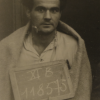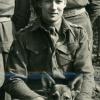The Reader’s Digest Association Limited, 25 Berkeley Square, London W1.
Alfred Spencer Reynolds, Esq, (‘Darkie’) 20th April, 1967.
1, Ship Cottages,
Green St. Green,
Nr. Dartford, Kent.
Dear Mr. Reynolds,
Your name appears in the records of those who may have taken part in the airborne assault on Holland in September, 1944. I am therefore writing to ask for your help with some research that we are doing on behalf of Mr. Cornelius Ryan, author of The Longest day and, more recently, The Last battle.
Would you be kind enough to answer the following questions in the spaces provided. Please return this letter to me as soon as possible so that Mr. Ryan may include your experiences in the account of the airborne invasion of Holland which he is planning to write. The book will include a chapter entitled “Where They Are Today”, in which your name and occupation will be listed with full acknowledgement. Your assistance will be very much appreciated.
Yours Sincerely,
Michael Randolph,
Editor, British Editions.
1). Are your name and address correct on this letter? If not, please amend them.
2). If you can be reached by telephone, please give number.
Phone number: Longfield 2203.
3). What is your present occupation?
Foreman plasterer.
4). What was your rank and unit in September 1944?
Sergeant, 2nd Btn, Parachute Regt. B Coy. 1st Para Bgd, Lathbury.
5). What was your age in September 1944?
26.
6). Were you engaged or married then? To whom? If married, did you have any children at that time?
Married – no children – Maiden name of wife, Edith Denyer.
7). Where were you born?
1, Ship Cottages, Green St. Green, Nr. Dartford, Kent. (Present address)
8). What previous action had you seen?
Action with Parachute Btn in North Africa from November 1942 to July 1943. Sicily July 1943, and Italy from September 1943 to December 1943.
9). When did you learn that you were going to take part in the operation in Holland?
Sat, 16th September 1944.
10). What was your reaction? Were you, for example, anxious, resigned or relieved to be going into action?
Relieved to be going into action.
11). What was the trip like into Holland? Did you see anything unusual? Do you remember any conversations you had, or how you passed the time on the journey?
Noticed the flooded land. Passed the time wondering with the others what it would be like. We had been given the impression it would be easy, but knew that none of our ‘jobs’ were easy.
12). How did you feel about a daylight operation? Do you recall any conversations with your friends about it? What was said?
No reaction about a daylight operation, cannot recall any conversation.
13). What were the rumours? Had you heard, for example, that if the invasion of Holland was successful, the war would be over by the coming winter?
Yes, we had heard that.
14). Did you keep a diary or notebook of what happened to you during any part of September, 1944? Do you still have it?
Did not keep one.
15). Were any of your friends killed or wounded on the day of the drop or on subsequent days?
On the 17th Sept, in my Coy, Lt. cane was killed, the Grundy? [Gronert] twins (aged 21). [All of 6 Platoon]
16). Do you remember any conversations you had with them before they became casualties?
No.
17). Were you wounded or captured during this period? Can you give details?
Wounded near a small railway bridge which crosses a road at Oosterbeek on the evening of Sunday 17th. Two bullets, one in right shoulder (still in) & one in right ankle (which was removed by a Dutch Dr, in a farmhouse nearby). Also received shrapnel wounds from the shelling of the Hotel Tafelberg during the next few days.
18). Do you remember any significant dealings you may have had with Dutch civilians or members of the Dutch Underground? Please explain.
The Dutch farmer who took us in was kindness itself. He sent his daughter to fetch the Dutch Dr. His wife tore up her sheets for our wounds, and next day he hid us in the bottom of his cart & took us to the Hotel Tafelberg, which was being used as a Dressing Station.
19). What do you recall most vividly about the country of Holland?
The cleanliness of the country & the hospitality and kindness of the people.
20). Do you recall any incidents with the Germans – fights, surrenders, truces or conversations you may have had with them afterwards?
No.
21). Do you know of others who took part in the operation, to whom we might write? Please give their names and last-known addresses.
Mr. H. Back, 55 Pembroke Rd. N13. [2nd Para Battalion, Intelligence Section]
Mr. A.J. Ward, 26 Cotswold Gdns, Hutton Nr Brentwood, Essex.
Mr. W.J. Bloys (Mr Ward will know his present address) [2nd Para Battalion, CO’s Protection]
22). Do you recall seeing or hearing anything that seems humorous now, even though it may not have seemed so at the time?
No.
23). Do you recall any incident, sad or heroic or simply memorable, which struck you more than anything else?
No.
24). In times of crisis, people generally show great ingenuity or self-reliance; others sometimes do stupid things.
Do you recall any examples of either?
No.
If you need extra space for your answers to any questions, please write below. When you have completed this Questionnaire, we would appreciate your returning it in the enclosed reply-paid envelope. We shall, of course, acknowledge it. Thank you very much for your help.
I have attended 14 of the Pilgrimages to Arnhem and on various occasions have contacted the Dutch farmer who sheltered me, also his daughter and a Dutch Nurse, who assisted in the Hotel Tafelberg, during the Battle of Arnhem.
Sgt. Alfred Spencer Reynolds ‘Darkie’. Eccles.
B Coy.
2nd Para Bn.
1st Para Bde.
1st abn Div.
8th Dec, 1967.
Sgt. Alfred Spencer Reynolds ‘Darkie’ dropped on Sunday with B Coy of 2nd Para Bn. On that Sunday evening he was near a small railway bridge which crosses the lower road at Oosterbeek. Some of his Platoon were up on the bank while he and others of the Section went down under the bridge to the other side where there were some trees close by. Machine guns opened up and several men were wounded, including Reynolds, who got one bullet in his right shoulder (which is still in) and a second in his right ankle (this was removed by a Dutch Doctor in a farmhouse nearby). Reynolds collected the other wounded and went to a farmhouse nearby to ask if they could shelter in the barn and wait till the morning when they would try to get medical aid. The Dutch farmer refused to allow them to stay in the barn, but insisted that they come into the house.
He brought down bedding and blankets to a downstairs room, and his wife tore up her sheets for their wounds. The farmer’s two daughters, aged about 15 and 17 years, went to fetch a Dutch Doctor who removed the bullet from Reynold’s ankle. The men stayed just one night at this farmhouse. The next morning (sept 18th) the farmer hid Reynolds and his mates (about 6) in the bottom of his cart and took them to the Tafelberg.
Reynolds was in an upstairs room in the Tafelberg and while there a shell landed just to the right of his bed. A Dutch nurse and one of Reynolds [men] were killed in the room below. Reynolds got shrapnel in his neck, through his left arm and left leg and in the stomach.
On 26th Sept Reynolds was on the landing of the Tafelberg; a Medical Orderly, Cpl. Holt, M.M., was looking at his head when a shell hit the stairs. Two men who were sitting on the stairs were killed, and Holt got [shrapnel] in his armpit, and a Dutch nurse got a small piece in her leg. Reynolds was unharmed. Later he went to Apeldoorn.
Source:
Submitted by R Hilton
Read More




Latest Comments
There are currently no comments for this content.
Add Comment
In order to add comments you must be registered with ParaData.
If you are currently a ParaData member please login.
If you are not currently a ParaData member but wish to get involved please register.